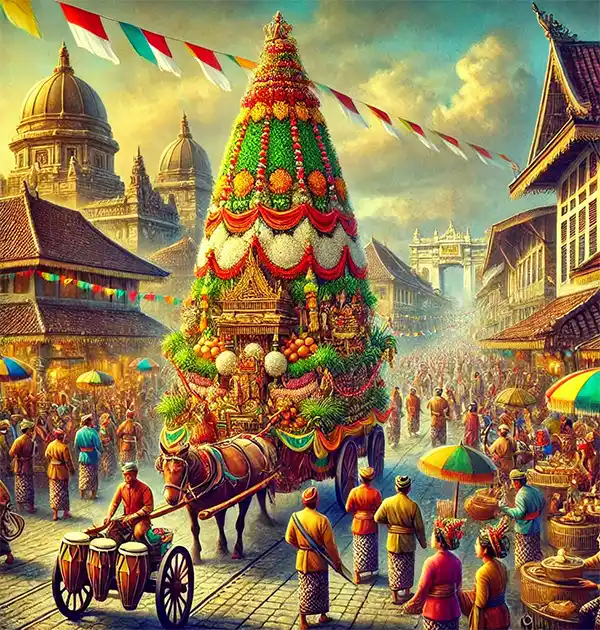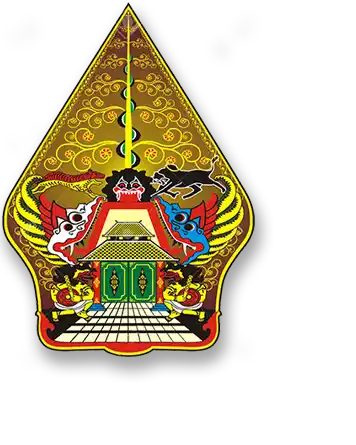A Unique Indonesian Celebration of Faith, Culture, and Music
Sekaten is one of Indonesia’s most vibrant and historic celebrations, taking place annually in the Javanese cities of Yogyakarta and Surakarta (Solo). Rooted in religious traditions and cultural expressions, Sekaten blends Islamic practices with Javanese customs, creating a festival rich in symbolism, ritual, and community participation. It typically runs for an entire week, leading up to the Prophet Muhammad's birthday, known as Maulid Nabi, marking it as both a religious and cultural event.
The Origins of Sekaten
The name Sekaten is believed to be derived from the Arabic word syahadatain, referring to the Islamic declaration of faith. According to historical accounts, Sekaten dates back to the 15th century during the reign of Sultan Hamengkubuwono I, the first Sultan of Yogyakarta, who is credited with initiating this celebration. The event was originally introduced as a means to spread Islam among the Javanese population. The festival’s religious significance is closely tied to the Islamic tradition, but its performance and atmosphere are uniquely Javanese, combining religious observances with cultural performances.
Cultural and Religious Significance
Sekaten reflects Indonesia’s syncretic culture, where Islamic practices coexist with Javanese traditions. It begins with a sacred ritual called the gamelan sekati, where two sets of ancient royal gamelan (traditional Javanese musical instruments) are played at the mosque courtyard for seven days. These gamelan, known as Kyai Guntur Madu and Kyai Nagawilaga, are believed to possess mystical powers and are only played during this time of year.
 As people gather to listen to the gamelan music, they also engage in prayers and religious activities that focus on Prophet Muhammad’s teachings. Historically, these musical performances were used to attract Javanese people to come and learn about Islam. While many now come for the cultural festivities, the underlying religious significance remains strong.
As people gather to listen to the gamelan music, they also engage in prayers and religious activities that focus on Prophet Muhammad’s teachings. Historically, these musical performances were used to attract Javanese people to come and learn about Islam. While many now come for the cultural festivities, the underlying religious significance remains strong.
The Procession of Gunungan
One of the key highlights of Sekaten is the gunungan procession. A gunungan is a large cone-shaped offering made of rice, fruits, and vegetables, symbolizing prosperity and gratitude to the Almighty for the harvest and the earth's bounty. On the final day of Sekaten, the gunungan is paraded from the royal palace (the Kraton) to the Great Mosque. Once it reaches the mosque, the offerings are blessed by the religious leaders. Afterward, the gunungan is distributed to the public, who eagerly scramble to get pieces of the offering, believing it brings good luck, protection, and prosperity for the coming year.
The entire processional event reflects the close ties between the sultanate, the mosque, and the local community, with the Sultan himself often playing an important role in overseeing or participating in the ceremonies.
Modern-Day Festivities
Though Sekaten began as a solemn religious event, it has evolved over the centuries into a major cultural festival. Today, the celebration includes a vast array of attractions, from traditional markets and food stalls to funfairs and performances of wayang kulit (shadow puppetry). In addition to the religious observances, visitors enjoy lively entertainment and cultural exhibitions, providing a colorful and festive atmosphere.
Visitors can sample traditional Javanese foods like nasi gudeg (young jackfruit cooked in coconut milk) and serabi (rice pancakes), while vendors sell everything from handicrafts to clothing. As a blend of religious devotion and cultural expression, Sekaten draws tourists and locals alike, offering a unique window into Indonesia's rich heritage.
Gamelan and Spiritual Connection
The gamelan performances at Sekaten hold special meaning. The gamelan instruments themselves are treated with great reverence, often considered to have a life force of their own. Each set of instruments has its own unique personality, with names that reflect this status. The sounds produced by these instruments are believed to have spiritual significance, and listening to the music is seen as a way to purify the soul and mind.
The rhythmic and melodic patterns of the gamelan are said to encourage meditation and introspection, providing a spiritual experience for those who listen. This connection between music, spirituality, and community underscores the unique role that gamelan plays in Javanese culture, particularly during the Sekaten festivities.
The Sultan’s Role in Sekaten
The Sultan is not just a ceremonial figure in Sekaten but an integral part of its proceedings. As the traditional ruler and spiritual leader of the people, the Sultan's involvement in the festivities adds a sense of royal grandeur. In Yogyakarta, the Sultan’s palace, or Kraton, serves as the focal point for many of the events. The procession of the gunungan from the palace to the mosque is one such example, symbolizing the Sultan’s role as a protector and unifier of his people through faith.
In many ways, Sekaten is a reflection of the historical relationship between the royal courts of Yogyakarta and Surakarta and the spread of Islam on the island of Java. The Sultan’s participation in the festivities is a living testament to this legacy, where the past and present converge in a unique cultural expression.
Sekaten in the Contemporary World
While the religious and cultural significance of Sekaten has remained intact over the centuries, the event has also adapted to modern times. Today, it is as much a tourist attraction as it is a religious ceremony. The festival has gained international recognition for its vibrant mix of tradition, music, food, and spirituality, drawing visitors from around the globe.
The blend of sacred and secular activities ensures that Sekaten remains relevant in contemporary Indonesian society. It serves as a reminder of Java’s rich history, its deep-rooted traditions, and the ways in which faith and culture intertwine. Even with the modernization of Indonesia, Sekaten continues to be a cherished event that showcases the enduring importance of community, faith, and cultural identity.
Sekaten is more than just a celebration of Prophet Muhammad’s birthday; it is a profound expression of Indonesia’s rich cultural heritage, blending Islamic traditions with the distinct practices of Javanese society. From the mystical sounds of the gamelan to the lively markets and processions, Sekaten offers a unique glimpse into the soul of Java, where the past is alive in the present and faith continues to be an integral part of daily life.
Whether you are drawn by the religious ceremonies, the cultural spectacles, or simply the atmosphere of festivity, Sekaten remains one of Indonesia’s most significant and beloved celebrations, bridging the spiritual and the worldly in a way that captivates both locals and visitors alike.
Please Share our Content






 As people gather to listen to the gamelan music, they also engage in prayers and religious activities that focus on Prophet Muhammad’s teachings. Historically, these musical performances were used to attract Javanese people to come and learn about Islam. While many now come for the cultural festivities, the underlying religious significance remains strong.
As people gather to listen to the gamelan music, they also engage in prayers and religious activities that focus on Prophet Muhammad’s teachings. Historically, these musical performances were used to attract Javanese people to come and learn about Islam. While many now come for the cultural festivities, the underlying religious significance remains strong.








 "Sláinte!" is a traditional Irish expression used as a toast, equivalent to "Cheers!" in English.
"Sláinte!" is a traditional Irish expression used as a toast, equivalent to "Cheers!" in English.